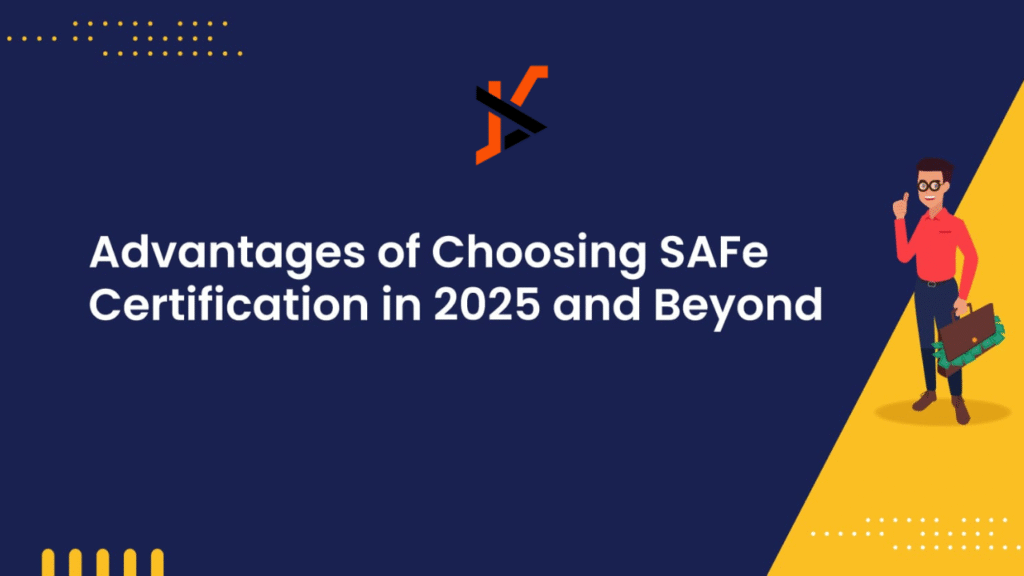In today’s fast growing business environment, organizations across the globe are embracing Lean-Agile transformation to maintain competitiveness and deliver value faster. As Agile adoption scales across teams, departments, and geographies, the need for a structured, enterprise level framework has become essential. This is where the Scaled Agile Framework (SAFe®) emerges as a frontrunner for both individuals and organisations. With its strong foundation in systems thinking, Agile development, and Lean product delivery, SAFe empowers enterprises to align strategy with execution at every level.
With 2025 underway, the need for SAFe-certified experts is rising steadily. Whether you’re a project manager, Scrum Master, product owner, or business leader, choosing a SAFe certification offers numerous advantages that go beyond job titles. It also equips you with the mindset, tools, and credentials to drive enterprise-level agility.
Why is SAFe Certification Gaining Demand?
The digital revolution has shifted market dynamics. Today, organizations are expected to innovate nonstop, adapt swiftly to change, and speed up time-to-market while maintaining top quality. Traditional project management approaches and team-level Agile practices alone are no longer sufficient. SAFe fills this gap by enabling end-to-end alignment across programs, portfolios, and value streams.
Professionals with SAFe Agile Certification are equipped to facilitate this transformation. They become change agents who understand how to coordinate multiple Agile teams, implement Lean Portfolio Management (LPM), and create a culture of relentless improvement.
Key Advantages of SAFe Certification in 2025 and Beyond
1. Enterprise-Wide Relevance
Unlike many other Agile certifications that focus primarily on team-level practices, SAFe prepares individuals to contribute across all layers of an enterprise. The framework is built to scale — making it ideal for organizations with hundreds or thousands of employees working across global locations. As a certified SAFe professional, you gain the skills to guide large-scale Agile transformations, which are increasingly vital in industries like banking, healthcare, telecom, and defense.
2. Standardized Framework for Large Teams
SAFe offers a clear blueprint for scaling Agile while preserving the core principles of collaboration, customer centricity, and value delivery. It eliminates inconsistencies between teams by promoting synchronized planning, cadence-based execution, and a shared vision. By gaining a SAFe certification, you position yourself as someone who can bridge strategic planning with tactical implementation — a skill in high demand for large enterprises managing complex programs.
3. Strong Career and Salary Growth
The job market in 2025 is seeing a surge in roles requiring SAFe expertise — including Release Train Engineers (RTEs), Solution Architects, and Agile Program Consultants. Employers are actively seeking professionals who can lead cross-functional teams and guide enterprise transformation efforts.
Global surveys reveal that SAFe-certified professionals typically earn higher salaries than those without certification. The combination of advanced Agile skills and leadership potential makes SAFe certification a worthwhile investment for long-term career progression.
4. Future-Ready Skills in Lean-Agile Practices
SAFe continuously evolves to reflect emerging trends in software delivery, DevOps, cloud adoption, and business agility. The latest versions of the framework emphasize topics such as Lean Portfolio Management, Agile product delivery, and organizational agility — making SAFe credentials highly relevant for future-ready leaders.
By pursuing SAFe SPC Certification (SAFe Practice Consultant), professionals gain advanced facilitation and coaching capabilities. SPCs are the architects of Lean-Agile change who can train teams, launch Agile Release Trains (ARTs), and support cultural transformation at scale. This prestigious credential opens doors to strategic leadership roles and consulting opportunities worldwide.
5. Global Recognition and Networking Opportunities
SAFe certifications are recognized and respected worldwide, making them valuable for professionals seeking international career opportunities. The SAFe community includes thousands of practitioners, coaches, and trainers working in diverse industries. Certification also offers access to global events, workshops, and forums where professionals can exchange insights, expand their networks, and stay ahead of Agile innovations.
6. Organizational Value Beyond IT
SAFe is no longer confined to IT departments. In 2025, organizations are adopting SAFe to enhance agility across finance, marketing, operations, and HR functions. This broader application creates new opportunities for professionals from non-technical backgrounds to become certified and lead enterprise-wide change initiatives.
As Agile becomes a business-wide capability, SAFe-certified individuals stand out as enablers of strategy execution and continuous improvement — regardless of their functional area.
Who Should Consider SAFe Certification?
SAFe training and certification is ideal for:
- Agile practitioners including Scrum Masters, Product Owners, & Developers
- Managers and Executives involved in transformation
- Project and Program Managers
- Change Agents and Agile Coaches
- Business Analysts and Architects
- Enterprise Consultants
Conclusion
Whether you’re just starting your Agile journey or looking to elevate your impact, there’s a SAFe certification that aligns with your role and aspirations. Choosing a SAFe certification in 2025 is not just about adding a credential to your résumé — it’s about becoming a catalyst for sustainable change. By investing in this journey, professionals empower themselves to deliver greater value, influence enterprise outcomes, and shape the future of work. SAFe-certified professionals are the backbone of Lean-Agile enterprises. In 2025 and beyond, those who are prepared to scale agility across teams, programs, and portfolios will not only lead successful projects — they will lead meaningful change.

